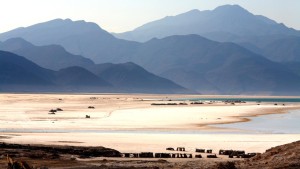By Mar Pages
An oasis of peace
Bordered by Somalia, Ethiopia and Eritrea, Djibouti is an oasis of peace in a part of Africa marred by piracy and instability. It is this privileged position that has made the country into an exclusive military playground, home to Africa’s largest US army base and France’s biggest Foreign Legion deployment. Currently, the 53,000 civilians who visit each year are mainly business travellers, and the largely empty planes to the country are virtually devoid of tourists.

But all this looks set to change over the next two decades. This tiny speck of a country has quietly been making headlines for its aspirations to become the Dubai of Africa.
The Dubai of Africa
Like Dubai, Djibouti’s arid landscapes are unsuitable for agriculture, so making use of the country’s strategic position at the mouth of the Gulf of Aden – the world’s highest traffic maritime route – is critical to turn the country into a regional logistics hub.
Fourteen infrastructure projects, amounting to over $14bn, are focused on expanding Djibouti’s sea, air and land connections by 2035. The most important for travellers will be the new airport, which will separate military and commercial use and have the capacity to welcome 30 times the current number of visitors.
Island life
But what Djibouti has that Dubai doesn’t, however, is extensive natural resources along with stunning geological, marine and cultural sites.
Djibouti’s 324km coast is the gateway to the Red Sea, drawing both wreck divers and whale shark lovers from October to February when the waters are at their warmest. Stunningly empty Moucha Island, with only 20 inhabitants, and minuscule Maskali Island, famous for its corals, offer mangrove kayaking and white sand beaches, along with excellent snorkelling and scuba diving. The ongoing construction of a luxury resort on Moucha Island, however, may attract renewed interest on this empty speck of fine sand, particularly by neighbouring Ethiopians looking to enjoy the beach life they lack.
Natural wonders
The country is packed full of geological oddities to rival Iceland’s surreal landscape. Lake Assal, 90km southwest of Djibouti city, is the third lowest point on Earth, at 155m below sea level. It’s lower than the Dead Sea – and with a higher salt concentration.
The few visitors who make the trek here will see a kaleidoscope of colours in the water, thanks to the natural biodiversity found here: green from the algae, brown from the minerals, blue from the sun’s reflections and white from the salt. Floating on the saline waters without another person in sight is a fascinating experience that rivals the crowded Dead Sea shores.
Read more: Is Africa getting a Dubai?
Source: BBC


